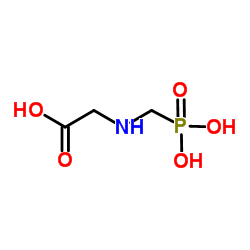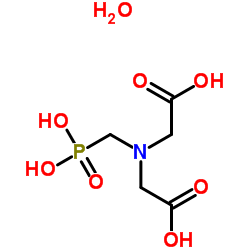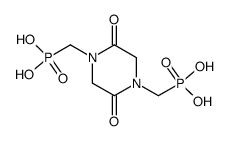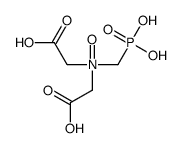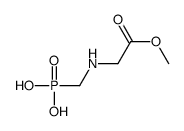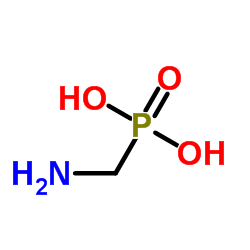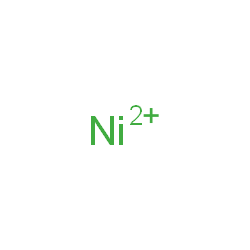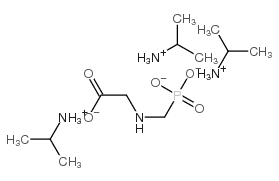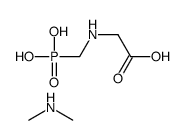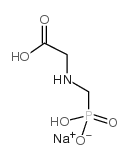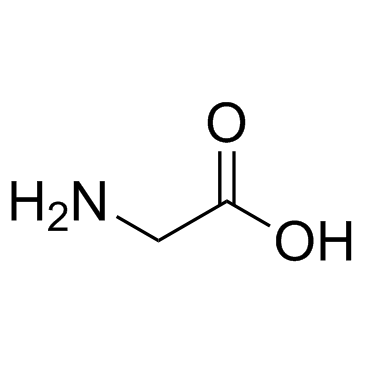CHEMICAL IDENTIFICATION
-
RTECS NUMBER :
-
MC1075000
-
CHEMICAL NAME :
-
Glycine, N-(phosphonomethyl)-
-
CAS REGISTRY NUMBER :
-
1071-83-6
-
LAST UPDATED :
-
199712
-
DATA ITEMS CITED :
-
16
-
MOLECULAR FORMULA :
-
C3-H8-N-O5-P
-
MOLECULAR WEIGHT :
-
169.09
-
WISWESSER LINE NOTATION :
-
QV1M1PQQO
HEALTH HAZARD DATA
ACUTE TOXICITY DATA
-
TYPE OF TEST :
-
LDLo - Lowest published lethal dose
-
ROUTE OF EXPOSURE :
-
Oral
-
SPECIES OBSERVED :
-
Human - man
-
DOSE/DURATION :
-
2143 mg/kg
-
TOXIC EFFECTS :
-
Vascular - BP lowering not characterized in autonomic section Lungs, Thorax, or Respiration - fibrosis (interstitial) Lungs, Thorax, or Respiration - fibrosing alveolitis
-
REFERENCE :
-
JTCTDW Journal of Toxicology, Clinical Toxicology. (Marcel Dekker, 270 Madison Ave., New York, NY 10016) V.19- 1982- Volume(issue)/page/year: 29,91,1991
-
TYPE OF TEST :
-
TDLo - Lowest published toxic dose
-
ROUTE OF EXPOSURE :
-
Oral
-
SPECIES OBSERVED :
-
Human - man
-
DOSE/DURATION :
-
1214 mg/kg
-
TOXIC EFFECTS :
-
Cardiac - change in rate Vascular - BP lowering not characterized in autonomic section Gastrointestinal - hypermotility, diarrhea
-
REFERENCE :
-
HETOEA Human & Experimental Toxicology. (Macmillan Press Ltd., Brunel Road, Houndmills, Basingstoke, Hampshire, RG21 2XS, UK) V.9- 1990- Volume(issue)/page/year: 10,103,1991
-
TYPE OF TEST :
-
LDLo - Lowest published lethal dose
-
ROUTE OF EXPOSURE :
-
Oral
-
SPECIES OBSERVED :
-
Human - woman
-
DOSE/DURATION :
-
4 gm/kg
-
TOXIC EFFECTS :
-
Cardiac - arrhythmias (including changes in conduction) Vascular - BP lowering not characterized in autonomic section Lungs, Thorax, or Respiration - respiratory depression
-
REFERENCE :
-
JTCTDW Journal of Toxicology, Clinical Toxicology. (Marcel Dekker, 270 Madison Ave., New York, NY 10016) V.19- 1982- Volume(issue)/page/year: 29,91,1991
-
TYPE OF TEST :
-
LD50 - Lethal dose, 50 percent kill
-
ROUTE OF EXPOSURE :
-
Oral
-
SPECIES OBSERVED :
-
Rodent - rat
-
DOSE/DURATION :
-
4873 mg/kg
-
TOXIC EFFECTS :
-
Behavioral - convulsions or effect on seizure threshold Lungs, Thorax, or Respiration - respiratory stimulation Nutritional and Gross Metabolic - body temperature increase
-
REFERENCE :
-
TXAPA9 Toxicology and Applied Pharmacology. (Academic Press, Inc., 1 E. First St., Duluth, MN 55802) V.1- 1959- Volume(issue)/page/year: 45,319,1978
-
TYPE OF TEST :
-
LC50 - Lethal concentration, 50 percent kill
-
ROUTE OF EXPOSURE :
-
Inhalation
-
SPECIES OBSERVED :
-
Rodent - rat
-
DOSE/DURATION :
-
>12200 mg/m3/4H
-
TOXIC EFFECTS :
-
Details of toxic effects not reported other than lethal dose value
-
REFERENCE :
-
85JFAN "Agrochemicals Handbook," with updates, Hartley, D., and H. Kidd, eds., Nottingham, Royal Soc. of Chemistry, 1983-86 Volume(issue)/page/year: A222,1984
-
TYPE OF TEST :
-
LD50 - Lethal dose, 50 percent kill
-
ROUTE OF EXPOSURE :
-
Intraperitoneal
-
SPECIES OBSERVED :
-
Rodent - rat
-
DOSE/DURATION :
-
235 mg/kg
-
TOXIC EFFECTS :
-
Behavioral - convulsions or effect on seizure threshold Lungs, Thorax, or Respiration - respiratory stimulation Nutritional and Gross Metabolic - body temperature increase
-
REFERENCE :
-
TOLED5 Toxicology Letters. (Elsevier Science Pub. B.V., POB 211, 1000 AE Amsterdam, Netherlands) V.1- 1977- Volume(issue)/page/year: 1000(Sp Iss 1),148,198
-
TYPE OF TEST :
-
LD50 - Lethal dose, 50 percent kill
-
ROUTE OF EXPOSURE :
-
Oral
-
SPECIES OBSERVED :
-
Rodent - mouse
-
DOSE/DURATION :
-
1568 mg/kg
-
TOXIC EFFECTS :
-
Behavioral - convulsions or effect on seizure threshold Lungs, Thorax, or Respiration - respiratory stimulation Nutritional and Gross Metabolic - body temperature increase
-
REFERENCE :
-
TXAPA9 Toxicology and Applied Pharmacology. (Academic Press, Inc., 1 E. First St., Duluth, MN 55802) V.1- 1959- Volume(issue)/page/year: 45,319,1978
-
TYPE OF TEST :
-
LD50 - Lethal dose, 50 percent kill
-
ROUTE OF EXPOSURE :
-
Intraperitoneal
-
SPECIES OBSERVED :
-
Rodent - mouse
-
DOSE/DURATION :
-
130 mg/kg
-
TOXIC EFFECTS :
-
Behavioral - convulsions or effect on seizure threshold Lungs, Thorax, or Respiration - respiratory stimulation Nutritional and Gross Metabolic - body temperature increase
-
REFERENCE :
-
TOLED5 Toxicology Letters. (Elsevier Science Pub. B.V., POB 211, 1000 AE Amsterdam, Netherlands) V.1- 1977- Volume(issue)/page/year: 1000(Sp Iss 1),148,198
-
TYPE OF TEST :
-
LD50 - Lethal dose, 50 percent kill
-
ROUTE OF EXPOSURE :
-
Oral
-
SPECIES OBSERVED :
-
Rodent - rabbit
-
DOSE/DURATION :
-
3800 mg/kg
-
TOXIC EFFECTS :
-
Details of toxic effects not reported other than lethal dose value
-
REFERENCE :
-
PESTC* Pesticide & Toxic Chemical News. (Food Chemical News, Inc., 400 Wyatt Bldg., 777 14th St., NW, Washington, DC 20005) V.1- 1972- Volume(issue)/page/year: 7,6,1978
-
TYPE OF TEST :
-
LD50 - Lethal dose, 50 percent kill
-
ROUTE OF EXPOSURE :
-
Administration onto the skin
-
SPECIES OBSERVED :
-
Rodent - rabbit
-
DOSE/DURATION :
-
7940 mg/kg
-
TOXIC EFFECTS :
-
Details of toxic effects not reported other than lethal dose value
-
REFERENCE :
-
85JFAN "Agrochemicals Handbook," with updates, Hartley, D., and H. Kidd, eds., Nottingham, Royal Soc. of Chemistry, 1983-86 Volume(issue)/page/year: A222,1984
-
TYPE OF TEST :
-
LD50 - Lethal dose, 50 percent kill
-
ROUTE OF EXPOSURE :
-
Oral
-
SPECIES OBSERVED :
-
Bird - quail
-
DOSE/DURATION :
-
>4640 mg/kg
-
TOXIC EFFECTS :
-
Details of toxic effects not reported other than lethal dose value
-
REFERENCE :
-
PEMNDP Pesticide Manual. (The British Crop Protection Council, 20 Bridport Rd., Thornton Heath CR4 7QG, UK) V.1- 1968- Volume(issue)/page/year: 9,459,1991 ** OTHER MULTIPLE DOSE TOXICITY DATA **
-
TYPE OF TEST :
-
TDLo - Lowest published toxic dose
-
ROUTE OF EXPOSURE :
-
Oral
-
SPECIES OBSERVED :
-
Rodent - rat
-
DOSE/DURATION :
-
153 gm/kg/13W-C
-
TOXIC EFFECTS :
-
Liver - changes in liver weight Blood - changes in erythrocyte (RBC) count Biochemical - Enzyme inhibition, induction, or change in blood or tissue levels - transaminases
-
REFERENCE :
-
NTPTR* National Toxicology Program Technical Report Series. (Research Triangle Park, NC 27709) No.206- Volume(issue)/page/year: NIH-92-3135
-
TYPE OF TEST :
-
TDLo - Lowest published toxic dose
-
ROUTE OF EXPOSURE :
-
Oral
-
SPECIES OBSERVED :
-
Rodent - rat
-
DOSE/DURATION :
-
22500 mg/kg/90D-I
-
TOXIC EFFECTS :
-
Behavioral - somnolence (general depressed activity) Behavioral - food intake (animal) Gastrointestinal - hypermotility, diarrhea
-
REFERENCE :
-
HCKHDV Huanjing Kexue. Environmental Sciences. (China International Book Trading Corp., POB 2820, Beijing, Peop. Rep. China) 1976- Adopted vol. no. with Vol. 1, 1980. Volume(issue)/page/year: 5(2),52,1984
-
TYPE OF TEST :
-
TDLo - Lowest published toxic dose
-
ROUTE OF EXPOSURE :
-
Oral
-
SPECIES OBSERVED :
-
Rodent - mouse
-
DOSE/DURATION :
-
435 gm/kg/13W-C
-
TOXIC EFFECTS :
-
Gastrointestinal - changes in structure or function of salivary glands Liver - changes in liver weight Kidney, Ureter, Bladder - changes in bladder weight
-
REFERENCE :
-
NTPTR* National Toxicology Program Technical Report Series. (Research Triangle Park, NC 27709) No.206- Volume(issue)/page/year: NIH-92-3135
|



